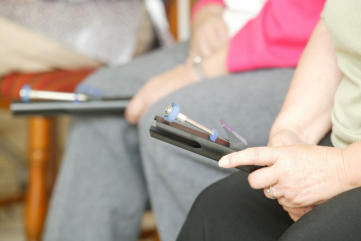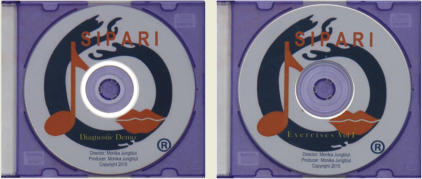Information for Patients
Group Therapy

In
order
to
intensify
motor
and
cognitive
improvement,
training-
CDs
and
DVDs
can
be
purchased
for
home
training
from
therapists who successfully completed the SIPARI® training.
If you have further questions, please contact
Dr. rer. medic. Monika Jungblut


S I P A R I ®
evidence-based music-supported therapy
for patients suffering from chronic aphasia


2025 © Dr. Jungblut
Disclaimer
The
SIPARI®
therapy
was
developed
by
Dr.
Jungblut
and
is
applied
exclusively
by
trained
and
certified
therapists
or
Dr.
Jungblut
herself.
Those,
who
are
interested
in
this
treatment
should
check
that
the
providing therapist successfully completed the SIPARI® trainings.


In
the
SIPARI®
group
therapy,
patients
are
joined
together
according
to
their
aphasia
syndrome
in
order
to
allow
an
effective
training.
Thus,
communication
between
group
members
is
supported
and
social
competence
strengthened.
According
to
our
research,
this
helps
patients
to
overcome
their
speech
inhibitions and improve their everyday communication.
Understandably,
group
therapy
focuses
on
interactive
and
communicative
aspects
among
the
group
members
themselves
supported
by
training
together.
Individual
therapy
puts
the
main
emphasis
on
specific
treatment
of
the
respective
language
and
speech-motor
impairment.
The
combination
of
individual
and
group
therapy
proved
to
be
particularly
effective
(see
controlled
group-study,
Cochrane Review
).

S I P A R I ®
evidence-based music-supported therapy
for patients suffering from chronic aphasia
Information for Patients
Group Therapy

2025 © Dr. Jungblut
Disclaimer

The
SIPARI®
therapy
was
developed
by
Dr.
Jungblut
and
is
applied
exclusively
by
trained
and
certified
therapists
or
Dr.
Jungblut
herself.
Those,
who
are
interested
in
this
treatment
should
check
that
the
providing
therapist
successfully completed the SIPARI® trainings
.

In
the
SIPARI®
group
therapy,
patients
are
joined
together
according
to
their
aphasia
syndrome
in
order
to
allow
an
effective
training.
Thus,
communication
between
group
members
is
supported
and
social
competence
strengthened.
According
to
our
research,
this
helps
patients
to
overcome
their
speech
inhibitions and improve their everyday communication.
Understandably,
group
therapy
focuses
on
interactive
and
communicative
aspects
among
the
group
members
themselves
supported
by
training
together.
Individual
therapy
puts
the
main
emphasis
on
specific
treatment
of
the
respective
language
and
speech-motor
impairment.
The
combination
of
individual
and
group
therapy
proved
to
be
particularly
effective
(see
controlled
group-study,
Cochrane Review
).
In
order
to
intensify
motor
and
cognitive
improvement,
training-
CDs
and
DVDs
can
be
purchased
for
home
training
from
therapists who successfully completed the SIPARI® training.
If you have further questions, please contact
Dr. rer. medic. Monika Jungblut































